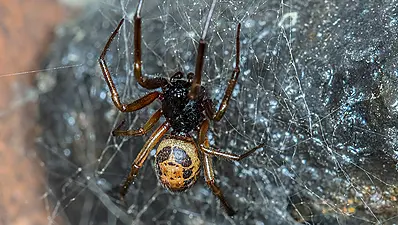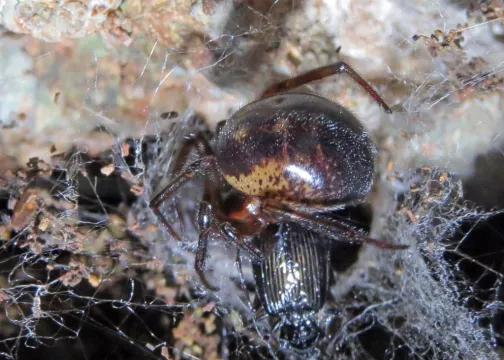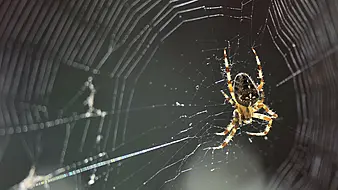Spider bites from noble false widows can be so severe that it requires hospital treatment, a new study has revealed.
The threat posed by the noble false widow spider has been debated among spider and healthcare specialists for many years.
The new study, published in the international medical journal Clinical Toxicology, confirms that some bite victims experience symptoms very similar to the true black widow spiders and some severe cases require hospital admission.
Originating from Madeira and the Canary Islands, the noble false widow spider Steatoda nobilis, now has the potential to become one of the world’s most invasive species of spider.
It was first documented in Britain over 140 years ago, but in recent decades the species has suddenly increased in numbers, significantly expanding its range and density.
The reasons behind this sudden expansion are not clear.
Scientists have ruled out climate change as the likely cause but have suggested that a new genetic mutation within the species may have made noble false widows more adaptable to new environments.
In addition, the species has benefited from an ever-increasing globalised economy, hitchhiking in containers and crates throughout the globe.
This species is here to stay, and we must learn how to live with it
Human movement has largely contributed to spread this species throughout Europe, North Africa, West Asia and parts of North and South America.
In parts of Ireland and Britain, it has become one of the most common species of spiders found in and around urban habitats.
With the increase in false widow spiders around homes, bites are becoming more prevalent, and scientists are now beginning to realise the full medical importance of these spiders.
Envenomation symptoms can be both localised and systemic, ranging from mild to debilitating pain and mild to intense swelling.
Some victims have experienced tremors, reduced or elevated blood pressure, nausea and impaired mobility.
In rare instances, victims have developed minor wounds at the bite site or had to be treated for severe bacterial infections.
DNA database
A team of scientists from NUI Galway established a DNA database to allow clinicians dealing with cases to confirm the species identity using genetic analysis.
Dr Michel Dugon, head of the venom systems lab at NUI Galway and senior author of the study, said: “In addition to their medically significant venom, noble false widows are extremely adaptable and competitive in the wild.
“Two decades ago, this species was almost unknown in Ireland, the UK or in continental Europe.
“We still have much to learn about its genetics, origin, behaviour and development. One thing is certain though, this species is here to stay, and we must learn how to live with it.”
Dr John Dunbar, postdoctoral researcher at the lab at NUI Galway and lead author of the study, said: “We only compiled envenomation cases where we had a clear identification of the spider responsible for the bite.
“We had to rely on DNA extraction and genetic profiling to confirm some cases.
“We are encouraging people to capture a photograph of the spider immediately after being bitten.

“Our latest study confirms without a doubt that noble false widows can cause severe envenomations.
“This species is increasing its range and population density which will undoubtedly lead to an increase in bites.
“While most cases will have a mild outcome, we need to continue to closely monitor bites by the noble false widow to understand the potential range of symptoms and to treat severe cases when they occur.”







